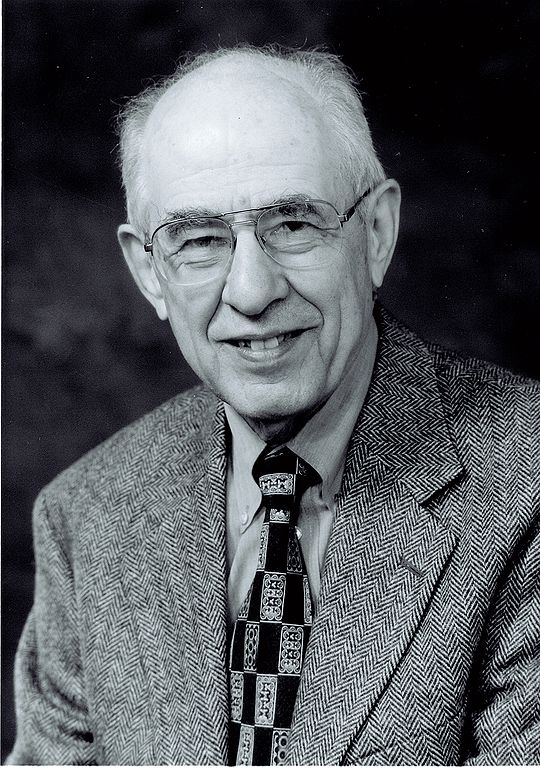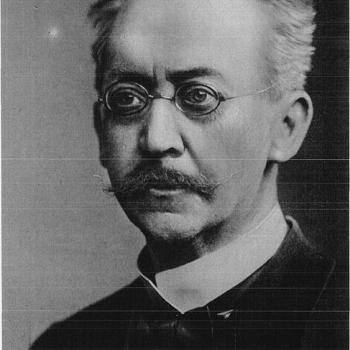— Positivist Myths and Fallacies Debunked by Philosophers and Mathematicians —
[originally posted on 7-14-10; abridged and re-edited on 9-7-15. Emphases in blue]
Philosopher Hilary Putnam (b. 1926) [Wikimedia Commons / Creative Commons Attribution-Share Alike 2.5 Generic license]
* * * * *
Dr. Jerry A. Coyne is a Professor in the Department of Ecology and Evolution at the University of Chicago. He earned his Ph.D. in evolutionary biology at Harvard University in 1978, working in the laboratory of Richard Lewontin. He has written over 110 refereed scientific papers and 80 other articles, book reviews, and columns, as well as the books Why Evolution is True and Speciation ( co-authored with H. Allen Orr).
In his article, “What evidence would convince you that a god exists?” (7-7-10) he made the following assertions:
One of the big differences between religion and science as “ways of knowing” is that in science we can almost always specify what observations or experiments would prove our theories wrong. In contrast, the faithful do not (and cannot) specify what observations would disprove their beliefs—or the whole basis of their religion. . . . the faithful carefully insulate those beliefs from disproof . . . Evidence for religious beliefs is counted; evidence against them is dismissed.
. . . the faithful often won’t let themselves even consider counterevidence. . . . Religion is not a way of knowing because it doesn’t have a way of knowing that it is wrong. And without that, you don’t know if you’re right.
In a second article, “Seeing and Believing: The never-ending attempt to reconcile science and religion, and why it is doomed to fail” (The New Republic, 2-2-09): a hostile book review of works by theistic evolutionists Karl W. Giberson and Kenneth R. Miller, Dr. Coyne continues the same hapless, droning theme:
Like all sciences, evolution differs from religion because it constantly tests its assumptions, and discards the ones that prove false. . . .
What, then, is the nature of “religious truth” that supposedly complements “scientific truth”? The first thing we should ask is whether, and in what sense, religious assertions are “truths.” Truth implies the possibility of falsity, so we should have a way of knowing whether religious truths are wrong. . . .
Anything touted as a “truth” must come with a method for being disproved . . .
I shall now cite philosophers and mathematicians (not all Christians, by a long shot), who hold that mathematics and some aspects of science (particularly at the level of grand theories) are not falsifiable; they are axiomatic or a priori forms of knowledge that are antecedent to and altogether distinct from empirical observation. Mathematics is central to much of science. Therefore, those particular branches of science are built upon a body of knowledge that is in itself unfalsifiable.
Thus, to claim that the only knowledge is that which is observable and falsifiable and to do so speaking from a scientific perspective, is to engage in vicious self-contradiction. In other words, if Christianity is unworthy of belief on these grounds, then so is mathematics, and since mathematics is crucial and central to science, the latter collapses with it (by this fallacious, incoherent reasoning). Conclusion: the argument proves too much, and so must be discarded as worthless. Christianity cannot be rationally dismissed on this basis.
1) John Passmore (philosopher), “Logical Positivism,” in Paul Edwards, editor, The Encyclopedia of Philosophy, Vol. 5, 52-57 (New York: Macmillan: 1967):
Verifiability. The course taken by the subsequent history of logical positivism was determined by its attempts to solve a set of problems set for it, for the most part, by its reliance on the verifiability principle. The status of that principle was by no means clear, for “The meaning of a proposition is the method of its verification” is not a scientific proposition. Should it therefore be rejected as meaningless? Faced with this difficulty, the logical positivists argued that it ought to be read not as a statement but as a proposal, a recommendation that propositions should not be accepted as meaningful unless they are verifiable. But this was an uneasy conclusion. For the positivists had set out to destroy metaphysics; now it appeared that the metaphysician could escape their criticisms simply by refusing to accept their recommendations. . . .
The logical positivists themselves were much more concerned about the fact that the verifiability principle threatened to destroy not only metaphysics but also science. Whereas Mach had been happy to purge the sciences, the logical positivists ordinarily took for granted the substantial truth of contemporary science. Thus, it was a matter of vital concern to them when it became apparent that the verifiability principle would rule out as meaningless all scientific laws.
For such laws are, by the nature of the case, not conclusively verifiable; there is no set of experiences such that having these experiences is equivalent to the truth of a scientific law. . . .
For these and comparable reasons “verifiability” was gradually replaced by “confirmability” or by the rather stronger notion of “testability.” Whereas at first the meaning of a proposition had been identified with the experiences which we would have to have in order to know that the proposition is true, now this was reduced to the much weaker thesis that a proposition has a meaning only if it is possible to confirm it, that is, to derive true propositions from it. . . .
Whether the confirmability principle can so be restated as to act as a method of distinguishing between metaphysical statements as meaningless and scientific statements as meaningful remains a question of controversy. . . .
Logical positivism, considered as a doctrine of a sect, has disintegrated. In various ways it has been absorbed into the international movement of contemporary empiricism, within which the disputes which divided it are still being fought out. Originally, it set up a series of sharp contrasts: between metaphysics and science, logical and factual truths, the verifiable and the nonverifiable, the corrigible and the incorrigible, what can be shown and what can be said, facts and theories. In recent philosophy, all these contrasts have come under attack, not from metaphysicians but from philosophers who would in a general sense be happy enough to describe themselves as “logical empiricists.” Even among those philosophers who would still wish to make the contrasts on which the logical positivists insisted, few would believe that they can be made with the sharpness or the ease which the logical positivists at first suggested.
Logical positivism, then, is dead, or as dead as a philosophical movement ever becomes. But it has left a legacy behind. In the German-speaking countries, indeed, it wholly failed; . . .
2) Rafe Champion (philosopher), “Agreeing to Disagree: Bartley’s Critique of Reason” (Melbourne Age Monthly Review, October 1985):
Critics have demonstrated that there is no way to justify positively (certainly) the basic premise of rationality itself (or indeed the basic premises of any argument) because any attempt to provide a reason to support the basic assumption of the argument simply begs the question to provide a justification for the supporting statement, and so on, ad infinitum. This has been a continual source of irritation to rationalists whenever an opponent bothers to make an issue out of it. For Bertrand Russell, one of the greatest rationalists of all time, frustration alternated with deep despair of reason. . . .
The problem for rationalists is that the traditional dogmatic framework of thought guarantees that the irrationalists can always win, any time that they force the issue and demand that the rationalist produce truly justified beliefs. That is to say, any time that Ayer (or Stove) is asked to nominate a theory along with its warrant of verification (or its numerical probability). In this way the dogmatic framework provides the seedbed for the weeds of irrationalism and this yields the shocking discovery that dogmatic (justificationist) theories of rationality actually nurture and maintain that seedbed. . . . the great rationalist Bertrand Russell fought irrationalism at one level but sustained it at a deeper level. . . .
Popper’s ideas have failed to convince the majority of professional philosophers because his theory of conjectural knowledge does not even pretend to provide positively justified foundations of belief. Nobody else does better, but they keep trying, like chemists still in search of the Philosopher’s Stone or physicists trying to build perpetual motion machines.
3) Charles Parsons (mathematician), Mathematics in Philosophy: Selected Essays (Cornell University Press, 2005, pp. 196-197):
But no proposition of pure mathematics has been falsified. If we view mathematics in this light,no proposition of Euclidean geometry is falsified by the discovery that physical space is not Euclidean. . . .
4) Charles Parsons, Mathematical Thought and Its Objects (Cambridge University Press, 2009, pp. xiii-xv):
I am not convinced that the notion of a priori knowledge is as clear as is often assumed. It is quite obvious that experience and perception do not play the direct role in the justification of mathematical propositions that they play in natural science or in most factual statements of everyday life. The mathematician in proving a theorem does not appeal to experimental results or other forms of observation. Rigorous proofs can generally be represented as deductions from axioms. . . .
5) Alvin Plantinga (philosopher), “Advice to Christian Philosophers” (Faith and Philosophy: Journal of the Society of Christian Philosophers, vol. 1, October 1984):
First, the dreaded “Verifiability Criterion of Meaning.” During the palmy days of logical positivism, some thirty or forty years ago, the positivists claimed that most of the sentences Christians characteristically utter-“God loves us,” for example, or “God created the heavens and the earth”-don’t even have the grace to be false; they are, said the positivists, literally meaningless. It is not that they express false propositions; they don’t express any propositions at all. Like that lovely line from Alice in Wonderland, “T’was brillig, and the slithy toves did gyre and gymbol in the wabe,” they say nothing false, but only because they say nothing at all; they are “cognitively meaningless,” to use the positivist’s charming phrase. The sorts of things theists and others had been saying for centuries, they said, were now shown to be without sense; we theists had all been the victims, it seems, of a cruel hoax-perpetrated, perhaps, by ambitious priests and foisted upon us by our own credulous natures.
Now if this is true, it is indeed important. How had the positivists come by this startling piece of intelligence? They inferred it from the Verifiability Criterion of Meaning, which said, roughly, that a sentence is meaningful only if either it is analytic, or its truth or falsehood can be determined by empirical or scientific investigation-by the methods of the empirical sciences. On these grounds not only theism and theology, but most of traditional metaphysics and philosophy and much else besides was declared nonsense, without any literal sense at all. Some positivists conceded that metaphysics and theology, though strictly meaningless, might still have a certain limited value. . . .
Many philosophically inclined Christians were disturbed and perplexed and felt deeply threatened; could it really be true that linguistic philosophers had somehow discovered that the Christian’s most cherished convictions were, in fact, just meaningless? There was a great deal of anxious hand wringing among philosophers, either themselves theists or sympathetic to theism. . . .
By now, of course, Verificationism has retreated into the obscurity it so richly deserves; but the moral remains. This hand wringing and those attempts to accommodate the positivist were wholly inappropriate. . . .the Verificationists never gave any cogent arguments; indeed, they seldom gave any arguments at all. Some simply trumpeted this principle as a great discovery, and when challenged, repeated it loudly and slowly; but why should that disturb anyone?
6) Hilary Putnam (philosopher), Words and Life (edited by James Conant, Harvard University Press, 1995, p. 258):
[A]s a matter of descriptive fact about our present cognitive situation, we do not know of any possible situation in which the truths of mathematics (as we take them to be) would be disconfirmed, save for situations in which the meanings of terms are (by our present lights) altered. To insist that these statements must be falsifiable, or that all statements must be falsifiable — is to make falsifiability a third (or is it a fourth by now?) dogma of empiricism.
7) Michael Scriven (philosopher), Evaluation Thesaurus (Sage Publications, 4th ed., 1991, p. 165):
The status of mathematics is also somewhat unclear on the falsifiability criterion, since it is widely believed to be tautological and hence not falsifiable, but it can hardly be said to have no information content in any useful sense. In fact, it is informative in much the same way that tautological scientific laws are informative.













